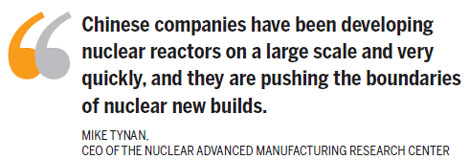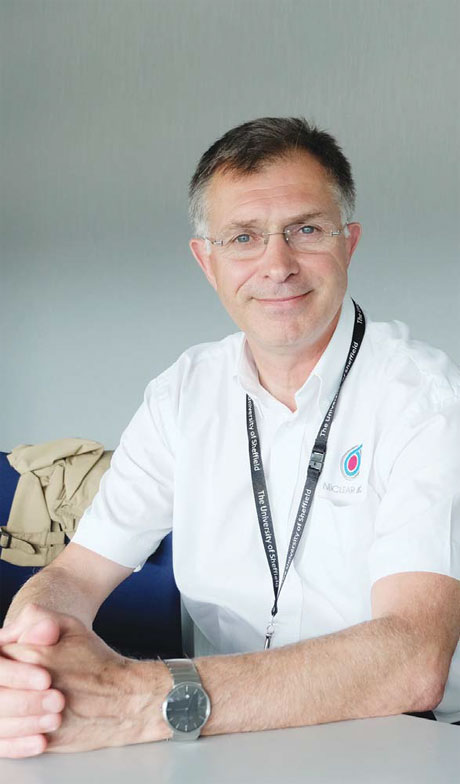Small reactors the smart way to go
Updated: 2015-07-10 07:22
By Cecily Liu(China Daily Europe)
|
|||||||||||
UK industry veteran would like Chinese companies to share in developing technology in his country
Chinese nuclear-power firms can be good partners for the United Kingdom in developing small, modular nuclear reactors, says Mike Tynan, CEO of the Nuclear Advanced Manufacturing Research Center.
Most of the world's existing nuclear technology is large scale, but Tynan and his team at the Nuclear AMRC believe small, modular nuclear reactors, or SMRs, could be the future of this industry because investment risks are easier to control.
|
Mike Tynan, CEO of the Nuclear Advanced Manufacturing Research Center. Cecily Liu / China Daily |

SMRs are defined by the International Atomic Energy Agency as advanced reactors producing up to 300 megawatts of electric power that can be largely built in factories and shipped to utilities and end users. The nuclear technology currently proposed for UK new projects includes: AP1000 developed by US firm Westinghouse, the European Pressurized Reactor by the French firm Areva and the Advanced Boiling Water Reactor by Hitachi.
Each of these nuclear technologies would be accompanied by a supply chain consisting mainly of companies located in the country where the technology originated. The UK does not currently have indigenous nuclear technology as its nuclear industry history is characterized by foreign investment.
But Tynan believes that the development of a new, UK-originated SMR technology could help exports from the country's nuclear chain and bring financial benefits to the country as joint intellectual property owner of the technology once it is exported.
"Chinese companies have been developing nuclear reactors on a large scale and very quickly, and they are pushing the boundaries of nuclear new builds. As a partner, they would provide tremendous opportunities for our companies to be involved in nuclear new builds," Tynan says.
But Chinese companies are also involved in developing SMRs. China National Nuclear Corporation is adapting AP1000 technology for its ACP100 SMR, with an output of 100 mW of electrical power plus 310 mW of thermal power that can be used in district heating schemes. CNNC is preparing a demonstration site with two units in Fujian province, and also developing a 120 mWe model.
The Nuclear AMRC, led by the University of Sheffield and the University of Manchester, was established in 2009 to help the UK's nuclear industry firms improve their technology through research and development and expertise sharing.
Tynan, who was previously chief executive of Westinghouse UK, came into contact with Chinese nuclear-power companies around 2011 when several expressed an interest in participating in Westinghouse-led AP1000 nuclear technology in the UK.
Although Chinese companies have not yet worked with Westinghouse in the UK, Tynan has maintained the relationship with the Chinese firms that have visited the Nuclear AMRC twice to learn about how it could help Chinese nuclear firms enter the UK market.
He says if Chinese nuclear technology is used in the UK, much of the work building the nuclear reactors will be done in the UK, and the Nuclear AMRC can play a crucial role in helping to incorporate the UK's nuclear supply chain firms into Chinese nuclear technology in the UK.
According to Tynan's estimates, about 60 percent of the value of Chinese nuclear technology in the UK can be localized, and this includes many of the smaller and high technology components, like fixtures, fittings, valves and larger components that would support the nuclear island and turbine island.
However, some aspects of Chinese nuclear technology would need to be made in China or other places, since the UK does not currently have the expertise to manufacture them, including the reactor pressure vessel.
"AMRC can provide help to UK companies in the nuclear technology supply chain to understand the requirements of the Chinese nuclear technology so it can best supply it. As well, my team can help the Chinese nuclear firms understand the UK's nuclear regulatory requirements and how to satisfy them," Tynan says.
He says although Chinese nuclear technology is already cost effective in China, in the UK it will become cost effective by incorporating the UK's advanced technology into its supply chain.
The UK firms would need to be chosen to work with Chinese nuclear technology based on their strength, rather than simply expecting to be taken onboard, because there is political pressure for the Chinese nuclear firms to use the local supply chain, he says.
"The Chinese firms will pick the right components, meaning that UK suppliers need to be genuinely competitive on cost, on schedule and on quality - this is the prime base of competition because if and when Chinese reactors are being built here everyone will be confident that it's safe, compliant and to the highest standards," says Tynan.
Tynan says building a nuclear reactor in the UK is very different from elsewhere because the Generic Design Assessment process used to give approval to nuclear projects is based on asking nuclear firms to demonstrate why their technology is safe, rather than being rules based, which just demands certain criteria be met.
"In the UK, if a company claims its technology is safe, it needs to demonstrate why it is safe, and present all the arguments, justifications and qualifications to show that it is safe. International standards are rules based, compliance with which would not provide sufficient evidence for the UK nuclear regulator unless they were contained in a UK regulator-approved nuclear safety case."
But once the Chinese technology has been approved for the UK, Chinese companies can continue to work on many more projects in the UK and Chinese nuclear technology would also be in a better position to be exported to other parts of the world, he says.
"Chinese nuclear technology will play a role in global nuclear power. There is a massive market in China, and also Chinese firms will develop technology for the rest of the world. If UK firms become a successful partner, it opens up opportunities over time worth billions of pounds," he says.
Tynan says that he believes Chinese third generation nuclear technology has quality and safety equal to that of all the other third generation nuclear technology in the world, and the continuous construction of nuclear reactors in China means nuclear firms are rapidly accumulating experience and improving their technology.
He says although the Nuclear AMRC is in the early stages of discussions with Chinese nuclear firms, cooperation could accelerate with the potential joint development of small modular nuclear reactors, with the possibility of new announcements later this year.
"In the last 30 years, the development of next generation nuclear reactors has generally been about economies of scale and enhanced safety, so people believed in the idea of the bigger the better, but this has also made reactors expensive to build.
"But what we have found is that those stations are very expensive, capital costs are so large and construction risks are so great that it is difficult to finance schemes of such size."
As a solution, Tynan says it could be better to build smaller, more affordable reactors, and this has a key advantage of flexibility because regions with little or no electricity grid can also build nuclear reactors with smaller costs.
SMRs are unlikely to be cheaper than the current generation of gigawatt-scale reactors in terms of cost-per-kilowatt - but they do promise a much lower capital cost, reduced construction risk, and a shorter period before they start generating electricity and income, according to Tynan.
SMRs will also be built in factory-controlled conditions, which create more control of the manufacturing process for building the reactor units, significantly reducing manufacturing costs. The British government is currently considering the possibility of pushing forward initiatives on SMRs.
"The UK government is entering a further period of feasibility study for the small modular reactor, which should conclude in spring 2016. There will hopefully be tremendous opportunities for UK and Chinese companies to be involved, should the UK government give the go-ahead for a demonstration SMR in the UK," Tynan says.
cecily.liu@chinadaily.com.cn
(China Daily European Weekly 07/10/2015 page8)
Today's Top News
BRICS 'disappointed' by US failure to ratify IMF reform
BRICS summit condemns WWII 'misrepresentation'
SCO can play major role in Silk Road, Xi says
Stocks surge as government moves to save market
Doubts over heroes' authenticity grow with widening Internet access
Sun and sand is where the wealthy from Chinese mainland head
Chinese stocks plunge to three-month low
Macedonia expects first mutiple unit train from China
Hot Topics
Lunar probe , China growth forecasts, Emission rules get tougher, China seen through 'colored lens', International board,
Editor's Picks

|

|

|

|

|

|







